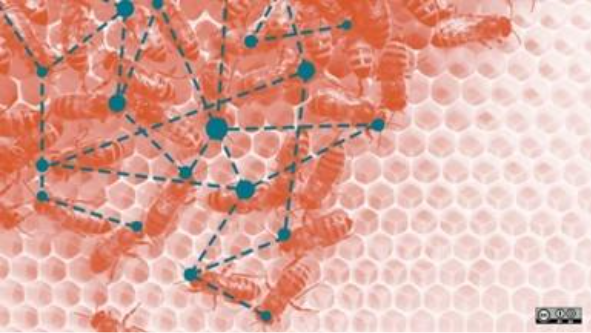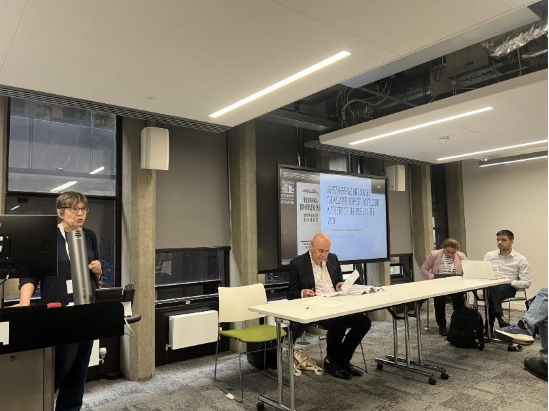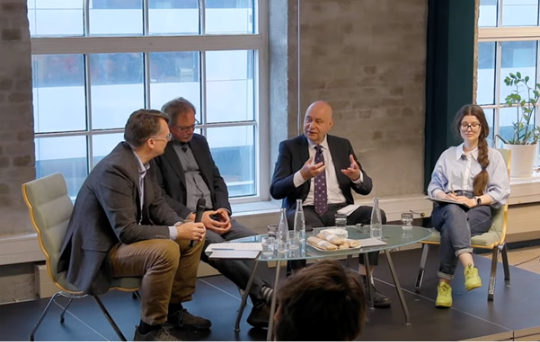Newsletter #4

Newsletter #4 - (Mis)Translating Deceit
This is the fourth issue of a newsletter produced by the AHRC-funded research project (Mis)Translating Deceit: Disinformation as a Translingual, Discursive Dynamic.
The project brings together researchers from the University of Manchester, the University of Leeds, the University of Loughborough and Chatham House to introduce a crucial new dimension to studying a global challenge of increasing concern.
This newsletter covers events, engagements, and publications from June 2025 to August 2025.
Academic Publications
Neil Sadler, 'Suspicious stories: taking narrative seriously in disinformation research', Communication Theory, 2025.
Abstract: The concept of narrative has been widely employed in the disinformation literature. Nonetheless, its use has been dominated by loose intuitions of what narratives are and do alongside vague accounts of specific stories. Theorized more carefully, thinking in terms of narrative has much to offer disinformation studies by helping to better define what constitutes disinformation and providing sophisticated frameworks for assessing specific content. To enable a nuanced view of narrative truth, I propose a “hermeneutic realist” approach in which stories “disclose” wider realities rather than constructing or simply reflecting them, supplemented with Phelan’s “narrative ethics” to facilitate inquiry into how far stories are morally legitimate. I apply these ideas in a case study of Twitter content posted by a Venezuelan political influencer blaming Russia’s 2022 invasion of Ukraine on NATO enlargement. In so doing, I show that content may be referentially and ethically problematic without necessarily being false.
Link to the Online First Open Access version: https://academic.oup.com/ct/advance-article/doi/10.1093/ct/qtaf013/8195864#525188601.
Alexandr Voronovici, ‘Labor für die Russische Welt: Selbstbild und Nation im Donbass [Laboratory for the Russian World: Self-Image and Nation in Donbas]’, Osteuropa, no. 5 (2025): 115-123.
The article is a part of the special section of Osteuropa, the leading German journal on East European politics. The special section is devoted to ‘(Pro-)Russianness” in the post-Soviet space. Alexandr co-edited this section together with Jan Zofka (GWZO Leipzig). Published articles are based on workshop papers presented at Imre Kertesz Kolleg Jena in May 2024. Alexandr and Jan co-organised the workshop with the support of colleagues at the Kolleg.
Abstract: The self-image of the ‘Donetsk People’s Republic’ has changed since 2014. Official documents and schoolbooks initially propagated a multi-ethnic regionalism to justify secession from Ukraine. With the ‘Russian Donbas’ doctrine, the idea that the People’s Republic belonged to the ‘Russian World’ came to the fore. However, what this world meant remained unclear. Some saw it in the tradition of the Russian Empire or the Soviet Union. Local politicians exploit the ambiguity of the word ‘Russian’. The article analyses the evolution of the ‘(pro-)Russian’ discourse in the ‘Donetsk People’s Republic’ , situating it at the intersection of secessionist state- and nation- building, propaganda, and shifting (geo)political contexts.
 Banner image from Emma Connolly’s blog on the challenges of tracking mis and disinformation.
Banner image from Emma Connolly’s blog on the challenges of tracking mis and disinformation.
New Blogs
Emma Connolly (Research Fellow at UCL's Digital Speech Lab) discussed why tracking mis and disnformation is challenging as it moves across platforms, and why it is vital its circulation is mitigated.
Olga Vlasova (Visiting Researcher, King’s College London) examined Russian propaganda, through the lens of emotional governance.
Nicolas Hénin (author, journalist, and our project consultant) explored Mauritania’s information ecosystems and their vulnerabilities.
 Vera Tolz presenting her paper at the XI World Congress of the International Council for Central and East European Studies (ICCEES). L-R: Stephen Hutchings, Ekaterina Kamenskaya, Alex Voronovici. Photo Credit: Maxim Alyukov.
Vera Tolz presenting her paper at the XI World Congress of the International Council for Central and East European Studies (ICCEES). L-R: Stephen Hutchings, Ekaterina Kamenskaya, Alex Voronovici. Photo Credit: Maxim Alyukov.
Latest Events
5th June: Stephen Hutchings spoke at PRIO's ‘Unpacking Russian disinformation and propaganda on Ukraine’ panel discussion in Oslo, Norway. The panel discussion was live-streamed and recorded. It can be viewed in full at https://www.youtube.com/watch?v=Gl5CMAUvbtM&t=6s.
9th June: Václav Štětka and Sabina Mihelj received the Best Book Award from the American Political Science Association (Information Technology & Politics Section) for their joint monograph on the Illiberal Public Sphere: Media in Polarized Societies, published open access by Palgrave in 2024.
23rd June: members of the project team participated in panels at the XI World Congress of the International Council for Central and East European Studies (ICCEES). More information about the papers presented can be found here.
Stephen Hutchings chaired a panel titled, “Soviet Newspapers and (Counter-)Propaganda: International and Theoretical Dimensions”. The panel featured papers by Vera Tolz, Alex Voronovici, and project affiliate Ekaterina Kamenskaya. Stephen also served as a panel discussant.
Stephen Hutchings and Vera Tolz launched Russia, Disinformation, and Liberal Order at ICCEES 2025 by hosting a book discussion about its aims, methods, and findings. You read more about it here.
Sabina Mihelj and Maxim Alyukov co-organized a panel exploring public perceptions of disinformation, media use and trust.
Public and Policy Engagement
Our project participants have contributed to public discussions by making appearances in media and policy circles.
Vera Tolz commented on the size and nature of RT’s global audiences in Adam Sherwin’s article ‘BBC Insiders Fear Russia Will Fill Void after World Service Cuts,’ published in The I Paper, 10 June 2025. The article is available here.
Sabina Mihelj participated in a roundtable convened by Chatham House and Alliance4Europe, focused on lessons emerging from experiences with foreign interference and influence operations during recent presidential elections in Poland and other European countries.
Maksim Markelov was invited to provide comments on Russia's new Global Fact-Checking Network for Information Integrity Hub’s newsletter, The Repost. You can read and subscribe to the newsletter here.
Maxim Alyukov and Alexandr Voronovici authored to an opinion piece on Russia's influence of Western AI for Al-Jazeera English Opinion together with their colleagues from the University of Bern. The article is available here.
Stephen Hutchings, alongside former postdocs Dr Precious Chatterje-Doody and Dr Rhys Crilley, provided comments to the BBC InDepth's article on Russian propaganda in the world. The article is available to read here.
Stephen Hutchings commented on Russia's Intervision song contest for The Guardian. The article is available to read here.
 Stephen Hutchings speaking at PRIO's ‘Unpacking Russian disinformation and propaganda on Ukraine’ panel discussion in Oslo, Norway.
Stephen Hutchings speaking at PRIO's ‘Unpacking Russian disinformation and propaganda on Ukraine’ panel discussion in Oslo, Norway.
Affiliated Projects
Members of the (Mis)Translating Deceit team play key roles in two other major research initiatives on mass and political communication, including disinformation. The synergy provided by the interplay of (Mis)Translating Deceit project and the outlined initiatives provides the framework for further expansion of the project network and of the spectrum of the research problems tackled by the team.
UKRI Network Plus 'Shifting Global Polarities: Russia, China, and Eurasia in Transitions'
This research programme, led by the University of Birmingham and involving the Universities of Manchester, Glasgow, and Oxford, brings together over 30 academics, policymakers, and artists from the UK and overseas. It seeks to understand and address the new challenges facing the region in the 21st century.
Stephen Hutchings serves as a Network Mentor to three projects sponsored by the Network.
Vera Tolz acts as a Network Mentor to two projects and a fellowship sponsored by the Network.
To find out more about the Network and its projects, please follow the link here: https://www.mis-translating-deceit.com/affiliated-projects/polarities.
Beyond Disinformation Research Network
Members of the Manchester- based “(Mis)Translating Deceit” project team established the “Beyond Disinformation” research network alongside our colleagues at the University of Toronto and the University of Melbourne. The project “Beyond Disinformation: Assessing Digital Communications Strategies of Hybrid Neo- Authoritarian Empires” received funding from the three involved universities.
The initiative provided funds allowing 4 of our PhD students and 2 of our postdoctoral researchers to undertake digital forensic methods training workshops run by the highly regarded Bellingcat Open Source Intelligence (OSINT) Investigative Journalism Group, and by the University of Manchester’s Methods@Manchester Summer School. The training, of considerable value to the participants’ current research and future career prospects, took place in May and June 2025. Each of them reflects briefly on their experiences, which you can read here.
To find out more about the Network and its projects, please follow the link here: https://www.mis-translating-deceit.com/affiliated-projects/beyond-disinformation
Resources
Bibliography
We have a working bibliography which represents a selection of publications that our team found useful in our research. The bibliography will be regularly updated (on average once every 6 months).
To download this list, please click the link here - https://www.mis-translating-deceit.com/resources/bibliography
Selective List of Counter-Disinformation Units (CDUS)
The following is a selective list of analytical units and organisations that aim to research and combat disinformation.
To download this list, please click the link here - https://www.mis-translating-deceit.com/resources/selective-list-of-counter-disinformation-units-cdus
Social Media
Want more updates from us? Follow us via the links to our accounts below:
X/Twitter: @m_deceit
Bluesky: @m-deceit.bsky.social
LinkedIn: (Mis)Translating Deceit (AHRC Funded Project)